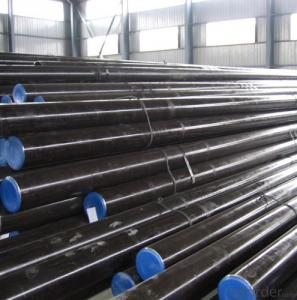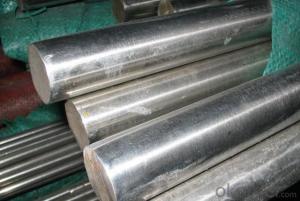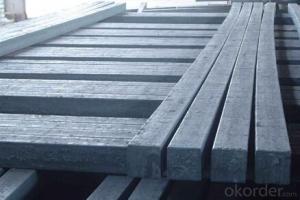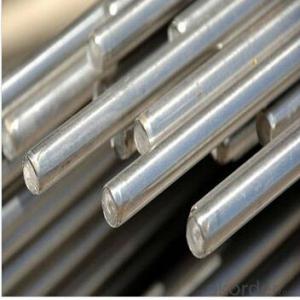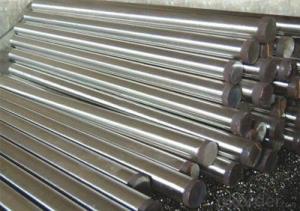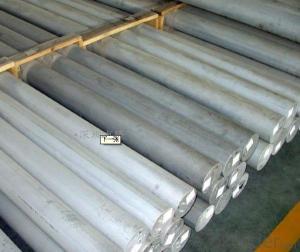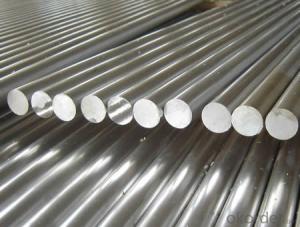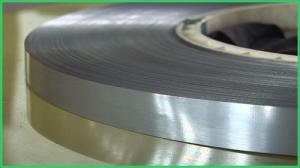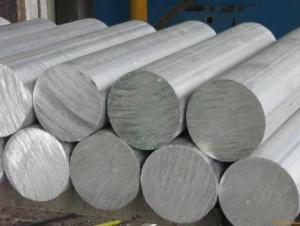Spring Steel Round Bar High Quality
- Loading Port:
- China Main Port
- Payment Terms:
- TT or LC
- Min Order Qty:
- -
- Supply Capability:
- -
OKorder Service Pledge
OKorder Financial Service
You Might Also Like
Product Description:
OKorder is offering Bearing steel at great prices with worldwide shipping. Our supplier is a world-class manufacturer of steel, with our products utilized the world over. OKorder annually supplies products to European, North American and Asian markets. We provide quotations within 24 hours of receiving an inquiry and guarantee competitive prices.
Product Applications:
Spring Steel can be divided into two types. One is carbon spring steel, and other one is alloy spring steel.
Alloy spring steel is based on carbon spring steel, by adding one or more alloying elements to improve the mechanical properties, hardenability and other properties to meet the requirement for manufacturing all kinds of spring steel.
Product Advantages:
OKorder's Bearing steel are durable, strong, and resist corrosion.
Main Product Features:
· Premium quality
· Prompt delivery & seaworthy packing (30 days after receiving deposit)
· Corrosion resistance
· Can be recycled and reused
· Mill test certification
· Professional Service
· Competitive pricing
Product Specifications:
-Material: 70Si2CrA
-Production: Hot rolled or cold rolled
-Standard: GB/T·5218-1999
-Type: Spring Steel
-Alloy or no: Alloy
Chemical Composition:
C | Mn | Si | Cr |
0.65~0.75 | 0.40~0.60 | 1.40~1.70 | 0.20~0.40 |
S | P | Ni | |
≤0.030 | ≤0.030 | ≤0.030 |
Mechanical Properties:
-Annealing Condition:
1, Tensile Strength: σb/MPa:≤835
2, Elongation: δ/%:≥8
-Quencher condition:
1, Tensile strength: σb/MPa:785~1175
2, Elongation: -
Packaging & Delivery of Spring Steel:
-Packing Detail: The products can be packed in bundles by steel wires.
-Marks:
1, Tag marks: the tag marks will be tied up to each bundle of the products. The information is usually including supplier’s logo and name, product name, made in China, products’ specifications, the painted color and other information requested by customers.
2, Color marks: we will paint both ends of the bundles of these products to make sure that they are more evident. It’s will be more convenient for the customers to distinguish them at the destination port.
-Delivery Detail:
1, Delivery time: 30~45 working days after receive buyer’s T.T. or L/C.
2, Delivery status should be written in the contract. (Heat treatment or no)
FAQ:
Q1: Why buy Materials & Equipment from OKorder.com?
A1: All products offered byOKorder.com are carefully selected from China's most reliable manufacturing enterprises. Through its ISO certifications, OKorder.com adheres to the highest standards and a commitment to supply chain safety and customer satisfaction.
Q2: How do we guarantee the quality of our products?
A2: We have established an advanced quality management system which conducts strict quality tests at every step, from raw materials to the final product. At the same time, we provide extensive follow-up service assurances as required.
Q3: How soon can we receive the product after purchase?
A3: Within three days of placing an order, we will begin production. The specific shipping date is dependent upon international and government factors, but is typically 7 to 10 workdays.
Images:
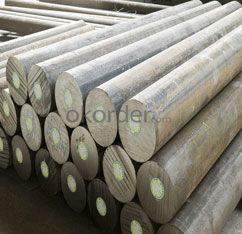
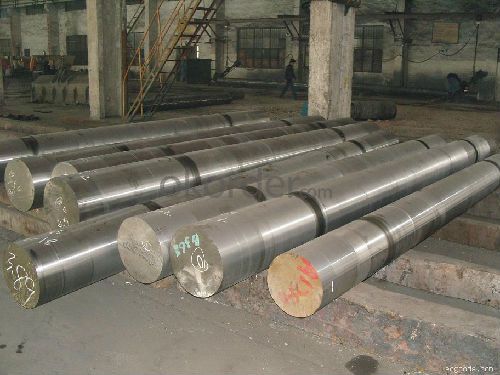
- Q: How are titanium alloys used in the medical industry?
- Titanium alloys are widely used in the medical industry due to their unique properties such as high strength, biocompatibility, and corrosion resistance. They are commonly used in medical implants, such as joint replacements, dental implants, and bone plates. These alloys promote better bone integration and reduce the risk of rejection or infection, providing patients with long-lasting and effective medical solutions. Additionally, titanium alloys are also used in surgical instruments and equipment, as they are lightweight and durable, enabling precise and efficient procedures.
- Q: What are the typical mechanical properties of special steel?
- The mechanical properties of special steel can vary depending on its specific grade and composition. However, there are certain general characteristics that can be anticipated. Special steels are often designed to have enhanced properties compared to standard carbon steels, which makes them suitable for specific applications that require superior strength, hardness, or resistance to wear and corrosion. One important mechanical property of special steel is its high tensile strength. These steels are typically engineered to have higher strength levels than standard steels. As a result, they can withstand heavy loads and stresses without deforming or failing, making them ideal for industries like construction, automotive, and aerospace where structural integrity is crucial. Special steels also demonstrate excellent hardness, which measures a material's ability to resist permanent indentation or scratching. This property is often achieved through the addition of alloying elements and heat treatment processes that enhance the steel's ability to resist wear and abrasion. Consequently, special steels are commonly used in tools, cutting equipment, and machinery components subjected to severe wear conditions. Furthermore, special steel alloys can possess exceptional toughness, which refers to the material's ability to absorb energy and resist fracture under impact or sudden loading. This is particularly important in applications where impact resistance is vital, such as the manufacturing of heavy-duty machinery or structures subjected to dynamic loads. Additionally, special steels may exhibit improved corrosion resistance compared to standard steels. This is achieved by incorporating alloying elements like chromium, nickel, or molybdenum, which create a protective oxide layer on the steel's surface, preventing or slowing down the process of corrosion. Industries dealing with corrosive environments, such as marine, oil and gas, and chemical processing, highly value this property. In summary, special steel possesses typical mechanical properties such as high tensile strength, excellent hardness, exceptional toughness, and improved corrosion resistance. These properties allow special steels to excel in various applications where superior performance is required, making them essential in numerous industries worldwide.
- Q: How is special steel used in the oil and gas industry?
- Special steel is extensively used in the oil and gas industry for various critical applications. It is used in the construction of drilling equipment, pipelines, and storage tanks due to its exceptional strength, corrosion resistance, and ability to withstand extreme operational conditions. Special steel also plays a vital role in the production and refining of oil and gas, as it is used in the manufacturing of valves, pumps, and other components that ensure efficient and safe operations.
- Q: How does special steel perform in high-temperature corrosion?
- Special steel performs well in high-temperature corrosion due to its unique composition and properties. It is designed to resist oxidation, scaling, and other corrosive reactions at elevated temperatures. The alloying elements present in special steel, such as chromium, nickel, and molybdenum, form a protective oxide layer on the surface, preventing further corrosion. Additionally, the high strength and heat resistance of special steel make it an ideal choice for applications in high-temperature environments, ensuring long-term performance and durability.
- Q: What are the main characteristics of corrosion-resistant steel?
- The main characteristics of corrosion-resistant steel include a high level of resistance to rust, corrosion, and staining. It is typically made with alloying elements such as chrome, nickel, and molybdenum, which enhance its ability to withstand harsh environments and corrosive substances. This type of steel is also known for its durability, strength, and longevity, making it suitable for a wide range of applications in industries such as construction, automotive, and marine.
- Q: How is stainless steel used in the production of kitchen utensils?
- Stainless steel is commonly used in the production of kitchen utensils due to its durability, corrosion resistance, and aesthetic appeal. It is used to make various utensils such as knives, forks, spoons, pots, pans, and cooking tools. The stainless steel material ensures that these utensils can withstand frequent use, resist rust and staining, and are easy to clean, making them ideal for use in the kitchen.
- Q: What are the requirements for special steel used in ballistic protection?
- The requirements for special steel used in ballistic protection are quite stringent and specific. Firstly, the steel should possess a high level of hardness and strength to effectively withstand the impact of ballistic threats. This is typically achieved through the addition of alloying elements such as chromium, nickel, and molybdenum, which enhance the steel's strength and hardness. Additionally, the steel should exhibit excellent toughness and ductility to prevent brittle fracture upon impact. This is crucial as it ensures that the steel can absorb and dissipate the energy from the ballistic threat, reducing penetration and minimizing the risk of injury. Furthermore, the special steel used in ballistic protection should have exceptional resistance to deformation and penetration. It should be able to resist deformation even under high-velocity impact, maintaining its structural integrity and preventing the penetration of the ballistic threat. Another important requirement is good weldability, as many ballistic protection components are typically assembled through welding. The steel should have low susceptibility to cracking during the welding process, allowing for the fabrication of strong and reliable ballistic protection systems. Lastly, the special steel used in ballistic protection should possess excellent corrosion resistance. This is necessary to ensure the durability and longevity of the protective equipment, especially in environments where exposure to moisture, chemicals, or harsh weather conditions is likely. To meet these requirements, various types of special steel have been developed, such as high-hardness armor steel, ballistic steel, and armor-piercing steel. These steels are often subject to rigorous testing and certification processes to ensure they meet the necessary ballistic protection standards.
- Q: How does special steel contribute to improving product efficiency in energy-intensive processes?
- Special steel plays a crucial role in improving product efficiency in energy-intensive processes due to its unique properties. Its superior strength, durability, and heat resistance allow for the design and manufacturing of more efficient and high-performing equipment. By using special steel components, energy-intensive processes can operate at higher temperatures, withstand harsh conditions, and reduce material wear, resulting in increased productivity, reduced downtime, and ultimately, improved energy efficiency.
- Q: How does special steel respond to welding?
- Special steel, also known as alloy steel, exhibits unique properties that affect its response to welding. Unlike regular carbon steel, special steel contains additional alloying elements such as chromium, nickel, or molybdenum, which enhance its strength, corrosion resistance, and heat resistance. When it comes to welding, special steel generally responds well due to its high tensile strength and toughness. However, there are a few considerations to keep in mind. The high carbon content in some special steels can lead to cracking or brittleness during the welding process. To prevent this, preheating the material and using appropriate welding techniques are crucial. It is important to choose the right welding method based on the specific type of special steel being used. For instance, gas tungsten arc welding (GTAW) or tungsten inert gas (TIG) welding is commonly preferred for welding stainless steel, as it ensures excellent control over the heat input and produces high-quality welds with minimal distortion. Furthermore, special steel often requires the use of special welding consumables, such as electrodes or filler wires, specifically designed for the particular alloy composition. These consumables help maintain the desired mechanical properties and prevent the formation of brittle phases in the weld. Post-weld heat treatment is also essential for certain special steels, as it helps relieve residual stresses and improves the overall weldment's properties. This process can involve annealing, normalizing, or tempering, depending on the specific steel grade and application requirements. In conclusion, special steel responds well to welding, but it's essential to consider its alloy composition, carbon content, and specific welding techniques. By following proper welding procedures, using appropriate consumables, and applying necessary heat treatments, high-quality welds can be achieved, ensuring the integrity and performance of the special steel components.
- Q: How is special steel used in the mining supply chain?
- Special steel is used in various ways in the mining supply chain. It is commonly used to manufacture heavy machinery and equipment such as excavators, drills, crushers, and conveyor systems, which are vital for extracting and processing minerals. The high strength and durability of special steel make it suitable for withstanding the harsh conditions and heavy loads encountered in mining operations. Additionally, special steel is used for constructing pipelines, storage tanks, and other infrastructure required for transporting and storing extracted minerals.
Send your message to us
Spring Steel Round Bar High Quality
- Loading Port:
- China Main Port
- Payment Terms:
- TT or LC
- Min Order Qty:
- -
- Supply Capability:
- -
OKorder Service Pledge
OKorder Financial Service
Similar products
Hot products
Hot Searches
Related keywords
